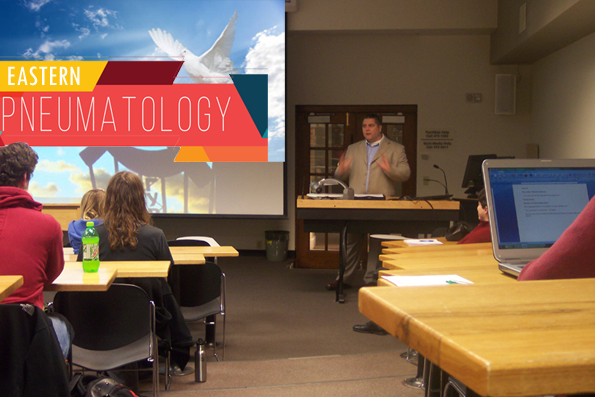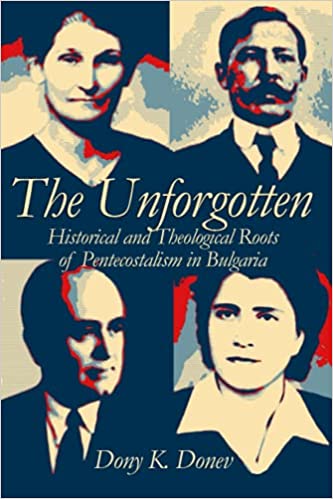The Non-Chalcedonian Eastern Church: West Syrian (Jacobite)

Dony K. Donev, D.Min.: Eastern Pneumotology Lectures
Eastern Orthodoxy can be expressed in one word: theism. The purpose and meaning of life is to become more like God. Deification is pursued by all means of human existence. This quest for divine likeness often includes the typical for the Eastern Church, speculation on the divinity and humanity of Christ, traditions on the doctrine of the Trinity and non-traditional mystical experiences. They appear in the context of both physical and spiritual characteristics in individual and corporate ecclesiastical environment. The role of the Spirit in the process of deification is threefold and involves: creation, re-creation and theism. Eastern Pneumotology follows the graduate process of theism development. The Spirit is involved in the original creation of the world as well as the new-birth experience. His work however, does not end there, but continues throughout the process of personal deification of the believer.
The Non-Chalcedonian Eastern Church: West Syrian (Jacobite)
The Jacobites viewed the presence of the Holy Spirit in three prime settings. Firstly, He is the agent of the original ex-nahilo creation and the spiritual re-creation in the second birth. Secondly, He is present in the baptism and chrismation. Lastly, He is the Transfigurator of the Eucharistic elements representing the body and the blood of Christ.5 [1]
Our prime source of information on the corporate ecclesiastical Coptic tradition is a document entitled The Odes of Solomon. Interesting to notice in this context of this writings is the fact that the Spirit is referred in a feminine gender.[2] However, this conception declined as the devotion to the person of Mary grew.[3]
Such a devotion is extraordinary noticeable in the life and writings of Ephrem the Syrian (ca. 306-373). He further compares the coming of the Holy Spirit upon Mary as the Spirit’s descent over both the water baptism and the elements of the Eucharist.[4] This is why in the Syriac baptismal service; the holy oil is powered onto the water.[5] For the same reason, Ephrem states that the Eucharist means involvement with the hosts of heaven.
Ephrem recognizes Spirit-activity through the entire panorama of salvation. The Spirit is present in the transformation of the fallen human creature into “the pristine of paradisiacal state.”[6] The gift of the Spirit is received in the water baptism where the believer receives a divine armor.[7]
A follower of Ephrem is Philoxenus of Mabbug (ca. 440-523). Among other issues, in his writings, he states that the life in the spirit is nothing else but a process of sanctification. He refers to it also as the spiritualization of the body, which is expressed through the domination of the body by the soul. The above results are possible only after fasting and prayer.[8] A contemporary of Philoxenus by the name of Severus of Antioch (ca. 465-ca. 539) adds to the above process the presence of the gifts of the Holy Spirit in the church as a sign of God’s divine election. In this sense, the Jacobites are carriers of the already-not-yet idea.[9]
[1] J. H. Barnard, The Odes of Solomon, Texts and Studies 8:3 (Cambridge: Cambridge University Press, 1912), 120-21.
[2] Ibid., 67, note on verse 17.
[3] Robert Murray, “Mary, the Second Eve in the Early Syriac Fathers,” Eastern Church Review 3:4 (Autumn 1971): 373.
[4] Ephrem, Nisibene Hymns 37.4 in CSCO 241, Syr. 103:13, and NPF 2nd Series 13:295.
[5] Ephrem, Hymns of Paradise 11, in CSCO 175, Syr. 79:43-46.
[6] Jean Danielou, From Shadows to Reality (Westminster: The Newman Press, 1960), 23-30.
[7] Ephrem, Hymns of the Epiphany 3.1-3, in CSCO 187, Syr. 83:18-19.
[8] E. A. Wallis Budge, The Discourses of Philoxenus, Bishop of Mabbogh, AD 485-519 (London: Asher and Co., 1894), “Eleventh Discourse on Assistance,” Budge 264.
[9] Burgess, 178.
Get Invested
Leaders not fully committed to investing in those they lead will fail. The best leaders support their team, build into their team, mentor and coach their team, and they truly care for their team. A leader not fully invested in their team won’t have a team – at least not an effective one. Never forget the old saying, people don’t care how much you know until they know how much you care – words to live by for leaders.
Elections in Bulgaria at Halt Once Again…
This is the third parliamentary snap election since 2021, an unprecedented situation in Bulgarian history, the previous ones being the April, July, and November 2021 elections. We are back at the red light like in 2014 at the 25th Anniversary of the Fall of the Berlin Wall…
Government Elections in Bulgaria (2005-2022):
2005 Parliamentary Elections
2006 Presidential Elections
2007 Municipal Elections
2009 Parliamentary Elections
2009 European Parliament elections
2011 Presidential Elections
2011 Local Elections
2013 Early parliamentary elections
2014 Early Parliamentary Elections
2015 Municipal Elections
2016 Presidential election
2017 Parliamentary elections
2019 European Parliament election (23-26 May)
2019 Bulgarian local elections
2019 Municipal Elections
2021 April National Parliament election
2021 Second National Parliament election
2021 Third National Parliament and Presidential elections
2022 October elections for 48th National Assembly after the fall of a four-party coalition in June 2022.
25 (now 33) Years after Communism…
25 years in 60 seconds at the red-light…
I’m driving slowly in the dark and raining streets of my home town passing through clouds of car smoke. The gypsy ghetto in the outskirts of town is covered with the fog of fires made out of old tires burning in the yards. And the loud music adds that grotesque and gothic nuance to the whole picture with poorly clothed children dancing around the burnings.
The first red light stops me at the entrance to the “more civilized” part of the city. The bright counter right next to it slowly moves through the long 60 seconds while tiredly walking people pass through the intersection to go home and escape the cold rain. The street ahead of me is already covered with dirt and thickening layer of sleet.
This is how I remember Bulgaria of my youth and it seems like nothing has changed in the past 25 years.
The newly elected government just announced its coalition cabinet – next to a dozen like it that had failed in the past two decades. The gas price is holding firmly at $6/gal. and the price of electricity just increased by 10%, while the harsh winter is already knocking at the doors of poor Bulgarian households. A major bank is in collapse threatening to take down the national banking system and create a new crisis much like in Greece. These are the same factors that caused Bulgaria’s major inflation in 1993 and then hyperinflation in 1996-97.
What’s next? Another winter and again a hard one!
Ex-secret police agents are in all three of the coalition parties forming the current government. The ultra nationalistic party called “ATTACK” and the Muslim ethnic minorities party DPS are out for now, but awaiting their move as opposition in the future parliament. At the same time, the new-old prime minister (now in his second term) is already calling for yet another early parliamentarian election in the summer. This is only months after the previous elections in October, 2014 and two years after the ones before them on May 2013.
Every Bulgarian government in the past 25 years has focused on two rather mechanical goals: cardinal socio-economical reforms and battle against communism. The latter is simply unachievable without deep reformative change within the Bulgarian post-communist mentality. The purpose of any reform should be to do exactly that. Instead, what is always changing is the outwardness of the country. The change is only mechanical, but never organic within the country’s heart.
Bulgaria’s mechanical reforms in the past quarter of a century have proven to be only conditional, but never improving the conditions of living. The wellbeing of the individual and the pursuit of happiness, thou much spoken about, are never reached for they never start with the desire to change within the person. For this reason, millions of Bulgarians and their children today work abroad, pursuing another life for another generation.
The stop light in front of me turns green bidding the question where to go next. Every Bulgarian today must make a choice! Or we’ll be still here at the red light in another 25 years from now…
Orthodoxy and Wesleyan Scriptural Understanding and Practice
“I sit down alone: only God is here; in His presence
I open and read this book to find the way to heaven”
– John Wesley
Our search for the theological and practical connection between Pentecostalism and Eastern Orthodoxy continues with yet another publication by St. Vladimir’s Press titled, Orthodox and Wesleyan Scriptural Understanding and Practice. The book represents an ongoing dialogue between the Orthodox and Wesleyan confessions and it emphasizes how theologians from both sides are attempting to discover commonalities in theology and praxis. To come together, not so much as theologians and thinkers, but as practical doers motivated by the proper interpretation of Scripture. As observed from the title, as well as through the text, these similarities are not necessarily in theological convictions, but in the proceeding Biblical approach toward interpretation of Scripture.
Orthodox and Wesleyan Scriptural Understanding and Practice is a compilation of essays from the Second Consultation on Orthodox and Wesleyan Spirituality under the editorship in 2000 of S.T. Kimbrough, Jr., who contributed the chapter on Charles Wesley’s’ Lyrical Commentary on the Holy Scriptures. I must issue the caution that the book is not an easy read. But it is by no means a book to be easily passed by Pentecostal scholars searching for the Biblical roots of Pentecostalism within the Eastern Orthodoxy.
The book begins with an interesting observation of the exegesis of the Cappadocian Fathers by John A. McGuckin, and continues with an article on the spiritual cognition of my personal favorite, Simeon the New Theologian by Theodore Stylianopoulos. Although the discussion on Gregory the Theologian, Basil of Caesarea and Gregory of Nyssa was thoughtful and presented in an interesting manner, the essay on St. Simeon struck me as well structured, but somewhat shallow.
An interesting approach was taken in Tamara Grdzelidze’s essay where she presented an orthodox perspective of the Wesleyan position on authority of scriptural interpretation. The essay had a very strong exposition in regard to the Wesleyan understanding of the importance of Scripture in Christian living. The latter part, which dealt with the influence of tradition, however was not investigated to its full capacity, which left the text (perhaps on purpose) open to multiple interpretations. Nevertheless, this issue was resolved later in the book by Ted Campbell that dealt with the subject from the Wesleyan perspective.
A central theme throughout the book was the comparison of prayers and song lyrics from both camps. Although I am no musical expert, I must agree with the authors when they say that theology in music has played an important role in both Orthodox and Wesleyan traditions. Music continues to be important in the everyday spiritual experience of the Pentecostal believer. This rather practical approach seemed to be the heart of the discussion where both sides could agree.
Finally, the role of the Holy Spirit is viewed as central for the reading, understanding and practicing of Scripture in both the Orthodox and Wesleyan traditions. For the Pentecostal reader, it may be easy to accept this presumption as similar to the Pentecostal experience, yet the book describes it in terms which will be somewhat foreign to many Pentecostals. Similarities between these interpretations of Scripture may be self-explanatory for the western Pentecostal reader. But due to the ever-present tension between Orthodox and Protestant denominations, those in an Eastern European context may disregard these similarities. But even if the Pentecostal scholar gathers nothing else from this book, they must recognize that the time has come for a formal Orthodox-Pentecostal dialogue, like the one which the World Council of Churches has been trying to put together since 1991.
One size fits all leadership style? No, thanks…
The best leaders are fluid and flexible in their approach. They understand the power of, and necessity for contextual leadership. “My way or the highway” leadership styles don’t play well in today’s world, will result in a fractured culture, and ultimately a non-productive organization. Only those leaders who can quickly recognize and adapt their methods to the situation at hand will be successful over the long haul. Think open-source not proprietary, surrender not control, and collaborate not dictate.
50% OFF SALE on Amazon
Revival Harvest Campaign Continues…

9/1-5 Florida
9/11-16 Tennessee
9/18-25 Georgia
10/2 South Carolina
NEW Bulgarian National Elections Ineffective Once Again
October 1, 2022 by Cup&Cross
Filed under Featured, Missions, News, Publication
Elections in Bulgaria: Can a Government be Formed? Lowest Voter Activity in 32 years
With 99.98% processed protocols in the CEC, 7 parties enter the next parliament. Here are the data as of 12.00 p.m. on October 3:
- GERB-SDS – 634,525 votes – 25.33%
- “We Continue the Change” – 505,914 votes – 20.20%
- Movement for Rights and Freedoms (DPS) – 344,605 votes – 13.76%
- “Vazrazhdane” – 254,725 votes – 10.17%
- Bulgarian Socialist Party (BSP) – 232,932 votes – 9.30%
- “Democratic Bulgaria” (DB) – 186,474 votes – 7.44%
- “Bulgarian Rise” – 115,837 votes – 4.62%
7 political parties elected with the following allocation of seats in the 48th National Assembly:
- GERB: 67
- “We Continue the Change”: 53
- Movement for Rights and Freedoms (DPS): 36
- “Vazrazhdane” (Revival): 27
- Bulgarian Socialist Party (BSP): 25
- “Democratic Bulgaria” (DB): 20
- “Bulgarian Rise”: 12
“Vazrazhdane” doubled its votes compared to the November 14, 2021 election, while the former ruling party, “We Continue the Change”, lost a quarter of the support it received then.
With “There Is Such a People”, the drop is about 60 percent of the vote for the party in November. GERB, DPS and “Democratic Bulgaria” are growing, although not drastically, while BSP continues the trend of shrinking its support.
175,338 Bulgarian citizens voted abroad. “We Continue the Change” and “Democratic Bulgaria” lost their electoral positions among Bulgarians abroad at the expense of the pro-Russian formation “Vazrazhdane”, which added more than 10 thousand votes to its result from November.
Boyko Borissov’s GERB is the first political force. It is followed by Kiril Petkov’s “We Continue the Change” with a difference of about 6-7 percent. The third position is for the Movement for Rights and Freedoms (DPS). The Bulgarian Socialist Party (BSP) is fourth. After them is the right-wing, pro-Russian “Vazrazhdane” (Revival), whose leader Kostadin Kostadinov insisted that the party will be #1 in these elections. Sixth is “Democratic Bulgaria” (DB).
Bulgaria: GERB offers Negotiations to Everyone – Borissov doesn’t want to be PM or MP
“I neither want to be prime minister, nor deputy, nor minister”, GERB leader Boyko Borissov commented at a party briefing whether he is inclined not to be prime minister in the next cabinet. “The results of the elections are expected, but they give a clearer picture of the state of the party at the moment”, said Borisov.
Tomislav Donchev thanked all the people who supported GERB-SDS. “The moment suggests a search for unity, for agreement. Out of 31, GERB-SDS won in 24 regions, DPS in 5, ‘We Continue the Change’ – in 2. The map is blue, but that is not the most important thing”, commented Donchev.
The data by municipalities are also eloquent – in 265 Bulgarian municipalities, GERB wins in 174, he added. He reported that the party had returned their support of over 38,000 people, showing that they were following the right direction in an extremely aggressive environment.
Bulgaria: Explosions at “Arsenal” Weapons Factory in Kazanlak – Casualties reported
The Regional Office for Fire Safety and Population Protection reports on an incident at the “Arsenal” plant in Kazanlak, Bulgaria. The signal was received at 11:04 a.m.
Two fire trucks from Kazanlak were sent to the scene, including departmental fire brigades and ambulances. According to unofficial information, there are two casualties, and eyewitnesses report that there was an extremely loud explosion and a dark cloud over the area.
*Update: 3 deaths reported, 3 injured people are transported to the hospital in Kazanlak.
The Labor Inspectorate confirmed the information about the incident, they also reported on an injured woman who was transported to the hospital in Stara Zagora.
Departures from Orthodoxy and Ministry Implications

Dony K. Donev, D.Min.: Eastern Pneumotology Lectures
Eastern Orthodoxy can be expressed in one word: theism. The purpose and meaning of life is to become more like God. Deification is pursued by all means of human existence. This quest for divine likeness often includes the typical for the Eastern Church, speculation on the divinity and humanity of Christ, traditions on the doctrine of the Trinity and non-traditional mystical experiences. They appear in the context of both physical and spiritual characteristics in individual and corporate ecclesiastical environment. The role of the Spirit in the process of deification is threefold and involves: creation, re-creation and theism. Eastern Pneumotology follows the graduate process of theism development. The Spirit is involved in the original creation of the world as well as the new-birth experience. His work however, does not end there, but continues throughout the process of personal deification of the believer.
Departures from Orthodoxy
And thus, we arrive at the point of departure from Orthodoxy. Similar to Eastern Pneumotology, this departure can be expressed in one word, dualism. A prime example of the dualistic heresy is the Messalian movement. Arising around AD 360 in Edessa, the Messalians are described as polytheistic. They believe that every human creature has a personal demon, and that Satan and the Holy Spirit together can dwell in the individual. The believers receive a share of the divine Spirit and become equal to God in their incapability to sin.[1] Interesting enough, the Messalians are highly feministic allowing their women to the top of the ecclesiastical hierarchy.
A similar movement arises under the name Paulicians. Due to the mass persecution through which the Paulicians go, the preserved documents about their existence in history are limited. We do know that they appeared in Armenia and the Byzantium Empire. The final trace of Eastern dualism is in on the Balkans, and more particular in Bulgaria under the name Bogomils. 18[2]
Ministry Implications
The next three brief ministerial applications are inspired and drown from the above research on the experiences of the Oriental Orthodox. They are taken in chronological order in its direct context of Pentecostal practices.
- Prayer is the constantly present element through which pneumatic and mystical experiences in the East are obtained. For example, Pallamas reports that the gifts of the Spirit are obtained only through intense mental prayer, which is often accompanied with tears. [3] In the same charismatic context Cassian concludes that after a season the gifts will disappear. My personal implication is that this is precisely the season when prayer and have become strange to the church, and when tears have become are sign of weekends rather than a sign of humility in the presence of the Almighty God. Unfortunately, at the end of the twentieth century, this is precisely our general present satiation.
- Peace of Heart: Hazzaya gives five practical signs for recognition of the works of the Holy Spirit: (1) love of God burns within the heart of the believer, (2) growth in humility of the soul, (3) kindness to all people, (4) true love and (5) vision of mind. His main tool to recognize demons and demonic visions from God and divine revelations is the peace of heart, which follows the heavenly presence.[4] I am persuaded that today the rule of the peace of heart is still true in the hearing of the voice of God.
- Return, reclaim and preservation: The Armenian faith practices focus on preservation of the apostolic doctrines and habits.[5] Symeon the New Theologian also calls for a return to a radical living of the Gospel.[6] In a similar way, the early Church of God claimed to have as a main goal the reclaiming of the power of Pentecost; however, the church today has evolved to a structure that is quite far from this former idea. Furthermore, in this process the church has become too distinguished, replacing the primitivism of the Pentecostal experience with higher education, development programs, sophisticated structures, etc. And while a century ago we were the persecuted and ridiculed, now we are the people who reject and mock churches that carry the Pentecostal primitivism. Through this, we not only deny our historical relationship with them, but also abolish our Pentecostal heritage, which we often like to brag about.
Nevertheless, similar to the early Pentecostal movement, revival will not come to our churches through sophisticated worship liturgies, but rather through a genuine return to the initial Pentecostal experience. At the end of the twentieth century, simply reclaiming the power of Pentecostal is not sufficient. We need to preserve the Pentecostal primitivism in the reality of our present ecclesiastical setting. Only then we will be who we claim that we are.
[1] John of Damascus, De Haeresibus Compendio, 80, PS 3/1:col. clxxvi.
[2] Steven Runciman, The Medieval Manichee: A Study of the Christian Dualistic Heresy (Cambridge University Press, 1974), chapters 2, 4, and 5.
[3] Burgess, 52-53.
[4] Ibid., 173-74.
[5] Ibid., 113.
[6] Ibid., 62.
It’s the culture, Sir
The lesson here is that culture matters – forget this and all other efforts with regard to talent initiatives will be dysfunctional, if not altogether lost. Don’t allow your culture to evolve by default, create it by design. The first step in cultural design is to be very, very careful who you let through the front door. People, their traits, attitudes, and work ethic (or lack thereof) are contagions. This can be positive or negative – the choice is yours. The old saying, “talent begets talent” is true, but talent that aligns with culture will produce better results than talent that does not.












